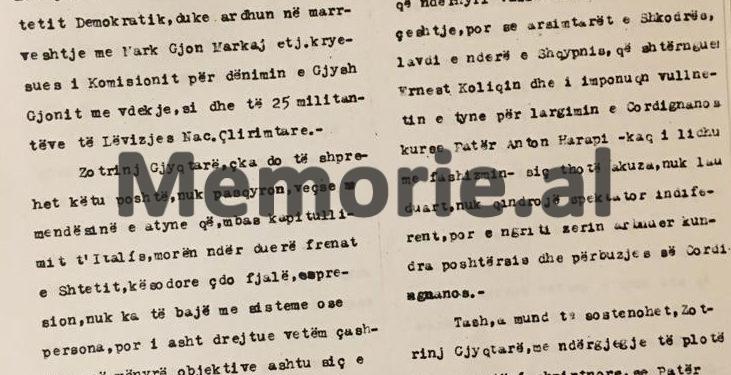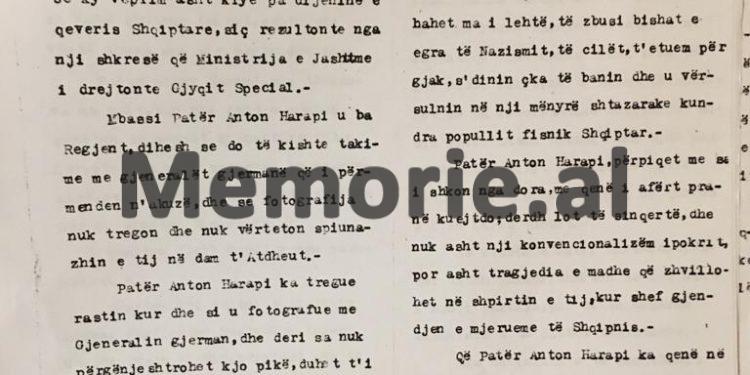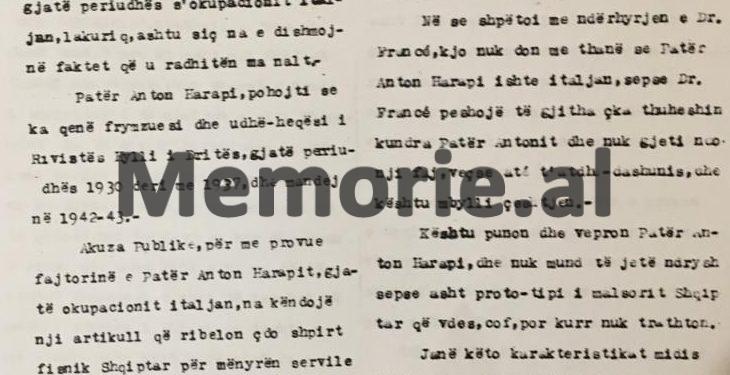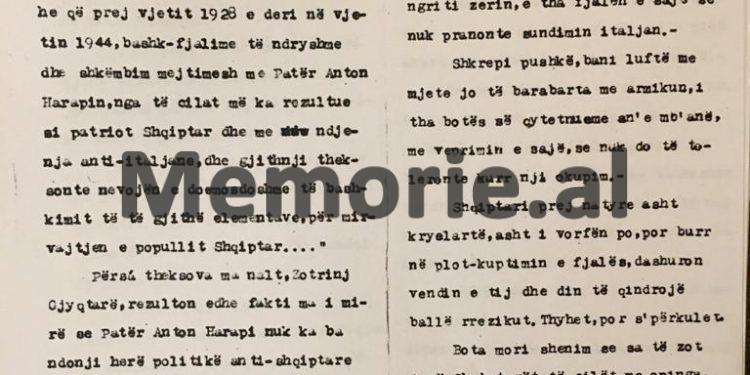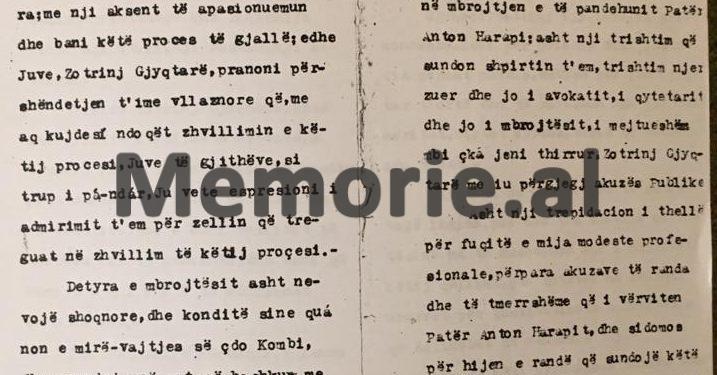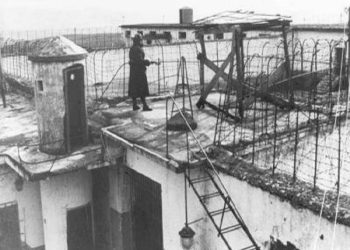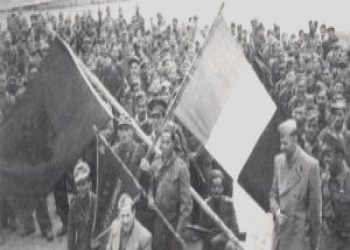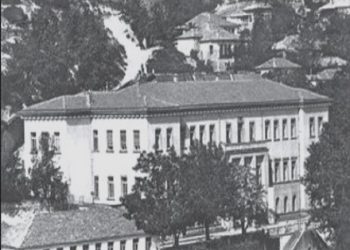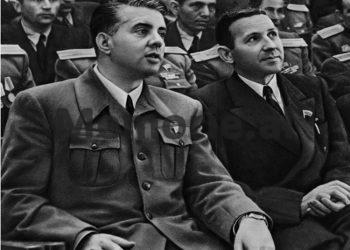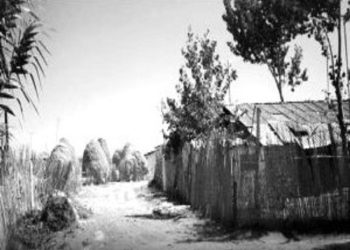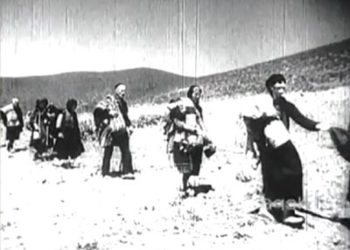Dashnor Kaloçi
Memorie.al publishes the full defense document made to Father Anton Harapi in the “Regency Court” on February 11, 1946, by his lawyer, Dr. Spiro Stringa, who from that time onwards, by his colleagues lawyers and well-known jurists who had graduated from the most prestigious universities in the West, has been described as one of the most brilliant defenses that can be made in all trials of the communist countries of Eastern Europe, where the so-called “collaborators and enemies of the people” were tried and convicted. The whole word of the defense of the lawyer Stringa, who after making a complete “overview” of the whole life and religious, patriotic and political activity of Pater Antoni, published there some statements and evidence that he had taken from some names well-known, such as Professor Gabriel Mex, Qirjako Haritos, Age Gruda, etc., who shed light on Harap’s patriotic and patriotic past, as well as the great help he had given to the communists during the German occupation of the country, by released from prison or spared the lives of many of them.
“Father Anton Harapi, a well-known name in this small Albania, and therefore there is no need to present it to you, because he is known as a pure and idealistic Albanian. Whoever had the opportunity to meet with Father Anton Harapi, left with the best memories that he had before his eyes a man in the full sense of the word, as imagined by the villager, mountaineer and citizen? Who has not been touched, Judges, by the voice of Father Anton Harapi, when he, without fear, raised his voice for the protection of Albanian rights, when Albania was a utopia, a dream, a meteor. Well, Judges, this dream, this utopia, this meteor, was molded by Father Anton Harapi together with other patriots in the most difficult times, and you make it a visible and tangible reality, and you make the name ALBANIA heard ‘e mb’anë. This Albania, despised, was neglected, a means of trading foreign powers, to become the object of conversation, and finally to hear the arbnuer voice. It cannot be judged, Mr. Judges, no one without knowing his past, this is what the nature of natural and positive Law requires. We cannot take Father Anton Harapi, as the accusation presents him, because it would be a sin, it would be a rape against his past. “Father Anton Harapi is not for the ‘divide et impera’ emblem, he is not one of those who came with suitcases on his arm, and on the most convenient occasion, with a go one day”.
This was stated by, among others, lawyer Dr. Spiro Stringa, in defense of his client, Father Anton Harapi in the “Regency Court” on February 11, 1946, where he was being tried as “enemy of the people.” But who was the lawyer Dr. Spiro Stringa and how did he protect Father Anton Harapi? In this regard, we are aware of the original documents donated to us by the family of lawyer Stringa and Memorie.al publishes in full starting from this article.
The word of defense of the lawyer Dr. Spiro Stringës, in the trial against Father Anton Harapi
It was a chaos. The nation was left without leaders, the German military occupation, in the full sense of the word, turned to the homeland, which then remained like a ship in the middle of the ocean without a compass. What was possible was done, what could be saved was saved, exposing those who took the reins of the State in their hands. In these critical times, Father Anton Harapi was not a collaborator or initiator of the creation of the Executive Committee, the so-called National Assembly. From all the present consequence, and from the ay of the Special Court, it has not come to light that Father Anton Harapi had a hand in the creation of the Executive Committee.
No move, no word makes Father Anton Harapi in this direction. Father Anton Harapi, Mr. Judges, is not a politician, he is just a writer, an idealist, and nothing else.
Father Anton Harapi does not dream of becoming a regent, he does not take advantage of the opportunity to be his nephew at the top of the State Pyramid, but he believes in the past of the other defendant Lef Nosi, and answers that he would be ready to accept being Member of the Regency, in case you are allowed according to canonical dogmas by the Vatican.
This condition should not aggravate the position of Father Anton Harapi, because if you belong to a Religious Institution, you should respect the relevant rules, and even less should aggravate Father Anton Harapi, the way the Vatican receives the permit, because does not develop the legal problem for which the defendant is charged.
Why did Harapi enter the Regency?
Here, on January 13, 1944, Father Anton Harapi, is found as a Member of the Regency, at the head of the State. From the legal point of view, his activity starts from this date, because according to the positive Law, no employee can start from the performance of duty, before taking the oath. By this time the winter operation was almost over; therefore it should be considered that Father Anton Harapi is not responsible for giving the previous order for the operations.
Father Anton Harapi is charged with a heavy responsibility, and does not know how difficult the leadership of the State is, which requires ingenuity, loyalty and good friends in cooperation. Father Anton Harapi, fall into the trap and he will not understand. Father Anton Harapi is used to being honest, but he does not know that in politics he is not as he thinks he is, and that this does not suit his leality. Father Anton Harapi lacks the evil intention of his entry into the Regency; and in the land of punishment, loz plays a very good intention, as this is not punishable. Father Anton Harapi, Mr. Judges, was attacked for collaborating with the terrorists of the February 4 and 27 massacres.
Can it be said, Judges, that Father Anton Harapi wanted these two ugly dates of Albanian history? Father Anton Harapi is not a wild beast, he has no animal instincts, he raises his voice where he should, he is terrified when he hears the bitter events of fatal dates, but alas his voice is ‘vox elementis in desorto’.
So, Father Anton Harapi cannot be charged for these serious crimes, which are products of the criminal instinct of those who paint their hands with Albanian blood, of those who, for personal selfishness, to nail down all the state powers, committed to shed the fraternal red blood in this martyred Tirana, which, more than other countries, I hear the strong fist of reaction that demanded at all costs in the press every manifestation of freedom.
Father Anton Harapi, Mr. Judges, is horrified by the fatal dates mentioned above, a fact that emerges from the statement issued by Mr. Professor Gabriel Meksi, who, among other things, mentions: “Father, what are you saying, that Lefi and I should run away, and your head is not safe”. Father Anton Harapi inadvertently entered a pond and turned around but could not. He demands, as much as possible, that degeneration not increase, that the suffering of anyone be reduced, that suffering be made easier, that the savage beasts of Nazism be softened, who, to be bloodied, did not know what to live and attack in a brutal way against the noble Albanian people. Father Anton Harapi, tries as much as he can, to be close to anyone; sheds sincere tears, and it is not a hypocritical conventionalism, but it is the great tragedy that develops in his soul, when he sees the miserable condition of the Albanians.
That Father Anton Harapi was in good faith when he entered the Regency, emphasizes and Mr. Qiriako Harito in the statement I co-submit. He opposed inflation as much as possible, but the circumstances led to an increase in the circulation of currency, because the Germans, after robbing the 120 million from the Bank of Italy, brought them here wanting to keep them to themselves, but then handed them over to the then Government, on the terms they always wanted, to take them, after being regarded as spoils of war, promoting the circulation of the German war mark, which would be catastrophic for the country’s economy.
As far as I can remember, it turned out to be an indisputable fact that indeed a part of the Durrës pier was demolished by the Germans, but that this action was carried out without the knowledge of the Albanian government, as it resulted from a letter that the Foreign Ministry addressed the Special Court. After Father Anton Harapi told the case when he was photographed with the German General, and until this point is denied, he should be trusted, since it is an action in favor of the defendant, especially when the accusation is serious and terrible. Father Anton Harapi does not appear to be a member of Balli, Legality, or Independent, and this fact is confirmed by the letter sent to Javer Hurshid. Any evidence that comes to the Court must be taken in its entirety, and not superficially, it must refer to time, otherwise it loses its meaning.
The words of congratulation that the defendant Father Anton Harapi gave to Javer Hurshid, respond to reality, because it is an indisputable fact that Eqerem Telhaj, we sent him as Prefect in Shkodra, was not able to stop the arbitrary actions of Gjon Marka Gjoni. That Father Anton Harapi did not get along well with John Mark John is confirmed by the letters that John Mark John sent to Father Paul, in which he describes how much controversy there is between Father Anton Harapi and John Mark John: it is clear that Father Anton does not want to enter the chariot of John Mark John.
In the letter of Javer Hurshid, Father Anton Harapi emphasizes that he does not belong to any party, but only wants the unity of all Albanians. From the statement of the defendant, Maliq Bushati, it is clear that the organizer and founder of the Shkodra Covenant was not Pëtër Anton Harapi, but that only when this was scattered and useless, he sought the support of the government, thus the deed of Anton Harapi’s father is null in this respect.
Father Anton Harapi is accused of spreading propaganda in Dukagjini and of stopping the population of this province in any way by supporting the National Liberation Movement. This fact has been categorically denied by the defendant, and you, Judges, can easily syndicate the activity of Father Anton Harapi, by asking the Assemblyman of this province, Mr. Kol Prela, who has described to you how the facts stood, so as the indictment states, or as he claims.
Father Anton Harapi, as I pointed out above, does what he can, saves as much as possible the sympathizers of the Movement, regardless of faith, province, ideology, but only to save the Albanians. Saves Ejel Matina from being shot. Saves the three daughters of Angjelin Luka: Prof. Anton Mazrreku, Injac Ndoja, Besim Vladin, tries for the deceased, Harito Hariton, saves the son of Lik Osmani’s lady, and the statement of Age Gjon Gruda is especially noteworthy, which literally states: “On 19 June 1943, in Tuz, all the men of the Great Highlands of Shkodra were united, according to the call of Dod Nikolla and Kol Bib Mirakaj. The aim was to send the men of Malsia to Milici and Gjindarma and to send them to Southern Albania, against the Nac-Liberation Movement. After the majority spoke in favor, I intervened in that matter myself, and with my words I made the people open their eyes and not send the Militia and the Gendarmerie, and the people revolted against sending the Militia, because he was a brother -vrasje. Even after this event, I laughed and was taken to Shkodra prison. Major Dod Nikolla and Mato Murati with friends, demanded my burning with gasoline, to set a barbaric example against anyone who dared to sabotage their work. My family then went to Father Anton Harapi and ay mediated and saved me from death, I shortened my days in prison, prepared my release, and from this mediation my brother was also released from prison, who had been caught together with me ”.
Father Anton Harapi saved many people from death
At the same time, for the sake of truth, I declare that Fr. crossed the border to confuse with the Montenegrin Partisans. Rescues Father Anton Harapi, Father Marin Prelaj, Parish Priest, Chairman of the Council, Pal Markun, Secretary of the Council; Nikoll Bardhin, Marka Gjinin, Gjergji Palin, Nikolla Pasha, Pjetër Nikolla; Nikola Shorreti, Maria Gjinin, Pal Hila and Anton Magjolini, fell into the hands of the Germans, from certain death, as evidenced by the testimony issued by the Presidency of the Nac Council. Çl. of the village Laç.
Even the prosecution witnesses admitted that when Ndue Pali went to the mountains, the relations between Balli Kombtar and Lëvizja were not broken, but here it should be noted that Ndue Pali does not come out with any party flag, but only as an Albanian to take action against the Italians, thus Father Anton Harapi cannot be responsible for the later activity carried out by Ndue Palit.
Father Anton Harpai, Mr. Judges, is ready to assume the responsibilities, as he himself has stated, but that the punishment must be commensurate with the guilt that Father Anton Harapi has rightly committed, and that can be charged to him personally, taking into account his pure past and the good he did during the occupation.
Gentlemen Judges, against Father Anton Harapi we should not shout ‘vae victis’, because we will be in front of the rectory of history, that is, we will be four centuries before Christ, before the expression of Benno, in other words, with went back to the time of darkness, and the present time has horizons, images of brotherhood not only among the inhabitants of a Nation, but also among peoples in general. Father Anton Harapi, had never lost his Albanian feelings, even in the infernal buffer during the Nazi occupation, was not stripped of any noble encouragement for the common good, a fact that proves that the Regency has accepted with anyone not to sign any death penalty act.
Gentlemen Judges, Aqili, victorious over Hector, before the graceful face of Elder Priamo, softens and respects his old age, and hands over his beloved son to remain victorious on the Battlefield; also to you, Mr. Judges, raised with human feelings, with a sound family education, respect Father Anton Harapi for his past, his old age, and pray, because ‘humanum est errare’.
Allow me at this hour to address Father Anton Harapi, in the presence of Your Excellency Judges, daughters of this people who will decide on his life and honor:
Father! The judges heard everything, and they spared his life, for the sole reason that you are a pure Albanian and because the sword of Justice falls only on those who have really painted their hands with blood, and not on the wrong people. , and have faith, Father in the exemplary Justice of the Albanian People, and therefore he, through You, Gentlemen Judges, with the decision that you will examine for the pardon of the life of the defendant, will show the world an ‘e mb because here, in this experienced Albania, there is no revenge, but only: Human Justice.
Tirana, on 11/2/1946
The advocate
Av. Dr. Spiro Stringa
Who was the lawyer Dr. Spiro Stringa?
Spiro Stringa was born in the city of Vlora on July 16, 1902 and his father, Jani Stringa, had completed his higher studies in Greece and after graduating there, returned to Albania where he worked for a long time in the field of education. From the beginning of the last century, in addition to his work in education, Jani Stringa was also engaged in patriotic activities and on November 28, 1912 when the independence of Albania was declared in Vlora, he was one of the signatories of that act, along with Ismail Qemali and other delegates. After finishing primary school in the city of Vlora, Spiro Stringa continued the classical gymnasium in the city of Trento, Italy, where he graduated with honors and gained the right to study to continue his studies in the field of Law at the University Faculty of Law of Rome. After four years of study, in 1929, Spiro Stringa graduated with honors, receiving the scientific degree of Doctor of Jurisprudence. After graduating in Rome, in the autumn of 1929, Spiro returned to Albania and at the behest of his Albanian fellow students studying in Italy, he delivered a greeting speech on their behalf over the grave of Avni Rustemi in Vlora, on the day of the anniversary of his assassination. Even after graduating and graduating from the Faculty of Law, Spiro Stringa did not interrupt his studies, but continued to be in contact with contemporary literature and numerous Italian, French, etc. encyclopedias, which helped him greatly in his professional preparation.
Stringa lawyer conflict with Lalë Krosi
In the early 1930s, King Zog appointed Spiro Stringa as a judge in the Tirana Court. At that time Spiro became well known as a judge and made a good name as a trained and unpretentious lawyer. His name became even more famous after a trial held in Tirana under his direction, when during the court hearing, he received a letter from Abdurrahman Krosi, or as he was otherwise known, Lalë Krosi, who was one of the people who had the greatest influence near King Zog. In that letter, Lalë Krosi ordered and suggested to lawyer Spiro Stringa, that he take the side of his friend in that trial. Lawyer Stringa, after reading that letter in the middle of the trial, tore it up demonstratively, declaring in the courtroom: “I judge fairly and in favor of the one who belongs to him.” This cost Stringa the transfer as a judge to the southern city of Gjirokastra, which came after the direct intervention of Lalë Krosi. Prior to this transfer, despite numerous interventions and suggestions made by his colleagues to apologize to Lalë Krosi, he did not do that, but accepted the transfer to Gjirokastra, where he worked for two years. After two years working as a judge in Gjirokastra, lawyer Spiro Stringa returned to Tirana and started working in his profession as a lawyer, where he soon became well known for his honesty and as a man who never compromised with judges in to the detriment of customers. At that time, the name of lawyer Spiro Stringa was often mentioned along with other lawyers of his colleagues, such as: Baltazar Benusi, Suat Asllani, Totozani, Sejdini, Kol Dhimitri, Bidoshi, etc., with whom he had very good relations. Lawyer Stringa is remembered by his contemporaries as a man who never took on legal issues which had no legal space to be won by the client, which gave him a pretty good name and he was quite sought after by everyone other lawyers, as well as in the judicial bodies of that time.
Advocate for former ministers in the Special Court
Both during the period of the Zog Monarchy and during the years of the fascist occupation of Albania, Spiro Stringa never interfered in any political formation that was created at that time, but always remained in his profession of lawyer. Even after the end of the War, Spiro Stringa refused to take up a post in the higher bodies of Justice, calling it incompatible and incompatible with his character. Spiro’s attention at that time was focused on his profession, where in March 1945, in the Special Court, he took over the defense of five former senior officials who were tried in that court, such as: former Prime Minister Koço Kota, ministers Zef Shiroka of Socrates Dodbiba as well as the senior military, Colonel Sulejman Vuciterni. In his defense of them in that trial, among others, Lawyer Stringa stated: “Mr. Judge, I want to remind you that the heavy burden that has been placed on us, both against the homeland and against the defendants, as well as against the conscience not us, as freelancers we are, as missionaries in the exercise of our profession, and not as one might mourn.We accept this burden because we have full conviction in the honesty and impartiality of Your Excellency Judges , as honest and leal warriors that you are “.
Further in his defense, Lawyer Stringa, after shedding light on the innocence of his clients with indisputable facts, at the end of his speech, stated: “Gentlemen judges. The Democratic Government solemnly, through its President, on dt 28 November 1944, proclaimed a general amnesty, except in cases of murder, burning, dishonor, etc., wanting to enclose the whole people in a single block, shaking hands with all as the sons of one country. My representatives, none of them has smeared their hands with blood to the detriment of the people, and consequently should benefit from the amnesty.Mr. Judges, is it a utopia that I have described above? Then give me the pleasure of having dreamed and guarded spiritually in such a state.If it is a reality, Gentlemen Judges, to you in action, to grant me innocence.Leon Tolstoy, the veteran and handsome old man who, among the Slavic population, preaches humanity and brotherhood , i moho n man the right to judge, for Justice is the thirst of the World, but that the Power of God. I do not say this to you: May the God of the innocent enlighten you and may the decision you have given me conform to Justice and Equity, and when you return home rejoicing in the peace of the family home, or mourning over your action, Let your conscience be calm, lest I see in your sleep the shadow of the innocent, adding to the terror, as the shadow of Macbeth added to the terror. ”
The arrest of Dr. Stringës, after defending Padre Anton Harapin
After the defense in the Special Court of his five clients, the former minister in the time of the Monarchy, one of the trials that gave the most famous lawyer Spiro Stringa, was the protection he gave to the famous cleric and politician, Regent Father Anton Harapi in 1946. Lawyer Stringa tried his best to save Father Anton Harap from the baseless accusations leveled against him by the law, making him a defense that was then called a rarity by his colleagues. This was one of the reasons why the communist regime in power wanted to take revenge on him. Thus, in December 1952, the State Security arrested lawyer Stringa, keeping him isolated at “Selvija” for more than six months. Only ten days later did his family learn the truth about his whereabouts, thanks to the kindness of a family friend named Nasho Bala. During those six months in the investigation, lawyer Spiro Stringa was accused of being “an agent of the Anglo-Americans and their liaison with Abaz Kupin, in an attempt to overthrow the People’s Power.” These accusations against Stringa were all baseless and absurd, as he was never involved in political problems and was further pressured not to defend the opponents of the ruling regime. The arrest and charges against him were nothing but a revenge of the communist government that came to power, for the protection he had given to the accused as “war criminals”, Koço Kota, Sokrat Dodbiba, Zef Shiroka, Sulejman Vuciterna and Patër Anton Harapit. After six months in solitary confinement in “Selvija” cells, seeing that there was no evidence against Stringa to implicate him as an agent of the Anglo-Americans and collaborator of Abaz Kupi, the State Security, in order not to acquit them months after he had been arrested, he accused him, in a very ridiculous way, of taking an old woman’s honorarium from Vora. But even this accusation against Stringa could not be substantiated and in his trial held in June 1953, the presiding judge, Veli Budo, acquitted him, releasing him in the courtroom. Although lawyer Stringa was acquitted and acquitted of the charges, he was clear of the attitude that the communist government was taking against him through the very clear signals being made to him. Even after the blow he suffered, lawyer Stringa did not retire from his profession, but continued to work as a lawyer until 1966, when Enver Hoxha abolished the Ministry of Justice and the Albanian advocacy itself, calling it unnecessary, because according to him, “Justice in Albania was defended by the Labor Party itself, which led the entire life of the country.” Lawyer Dr. Spiro Stringa passed away in November 1973, leaving his family without any kind of property and wealth, which proved the learning and honesty of his character as a pure idealist./Memorie.al




